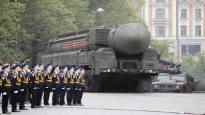According to US researchers, the nuclear deterrent has worked because Russia and the West have not drifted into direct confrontation. However, there is no guarantee of continuation.
The war in Ukraine has also put theories and thought processes regarding nuclear weapons and related deterrence to the test. At the same time that the states that signed the UN treaty aimed at banning nuclear weapons gathered for their first meeting at midsummer, it seems that nuclear weapons are here to stay.
Among other things, the minister Jaakko Iloniemi has estimated that nuclear weapons are even more attractive, because their possession seems to guarantee the country “a kind of immunity”.
Although nuclear weapons have not – fortunately – been used in Ukraine, they have nevertheless shaped the course of the war by their mere existence. Nuclear weapons did not prevent the outbreak of war in Ukraine, which is outside the West’s nuclear deterrence and has given up its own nuclear weapons. However, in many estimates, the prevention of the expansion of the war has been largely attributed to nuclear deterrence.
Professor of the United States by Jeffrey Lewis and research director by Aaron Stein according to the nuclear deterrent has worked by limiting the freedom of action of both Russia and the West. The United States and NATO have been careful not to participate in hostilities directly, and they have not sent their soldiers to Ukraine, even though there would certainly have been a temptation in the West and a need for it in Ukraine.
Russia, on the other hand, would certainly have been tempted and had military grounds to strike, for example, the Western arms aid to Ukraine stored in Poland, but at least so far this step has not been taken. The US and NATO nuclear weapons umbrella is not the least important factor here.
The brutality of human nature in the background
According to Lewis and Stein, nuclear deterrence works by definition in exactly this way: it frustrates the decision-makers and soldiers of both sides, who cannot or dare not take justified military actions, because the possibility of catastrophic and existential destruction haunts the background – the president Joe Biden i said “world war 3”.
– Nuclear deterrence is supposed to feel boring because it is based on a brutal assessment of human nature: people do not respond best to love, joy or pleasure, but to the threat of unrelenting pain, Lewis and Stein write On the War on the Rocks website (you will be transferred to another service).
However, there are no guarantees that nuclear deterrence will continue to function. So far, the West has estimated that it can send Ukraine plenty of arms aid, including heavy weapons, without the risk of Russia resorting to nuclear weapons. Russia, on the other hand, seems to think that no amount of brutality or destruction of civilian targets in Ukraine, which is outside of NATO’s security guarantees, exceeds the pain threshold of Western countries becoming a direct party to the war and risking the possibility of a nuclear war.
Among other things, the United States and NATO, which refused to establish a no-fly zone and send fighter jets, have, according to critics, limited their own freedom of action even too much and taken the threat of Russian nuclear weapons too seriously. At the same time, the president Vladimir Putin doesn’t seem to care much about Western deterrence.
According to Lewis and Stein, there are good reasons to be cautious, because getting into a nuclear war is not so much a jump from the edge into the void, but a continuous step on a slope where you can never know for sure when you have stepped too far.
– The fact that this is both difficult, frustrating and above all terrifying does not mean that nuclear deterrence does not work, Lewis and Stein write.
In response to the use of nuclear weapons, only bad alternatives
If nuclear deterrence on Russia’s side does work, Putin’s loose talk about the possible use of nuclear weapons, interpreted as intimidation, has so far not had the effect that the West would have stopped supporting Ukraine in military operations.
However, just a conventional attack on Ukraine has shown that Russia and its leader are ready for far greater, almost reckless risk-taking and costs in order to achieve their goals than Western countries. Therefore, fears about, for example, the desperate use of Russia’s tactical and lower-powered nuclear weapon in Ukraine cannot be completely ignored.
What reaction such a historic act would lead to from the West cannot be known for sure in Moscow.
Senior Research Fellow at the Royal United Services Institute (RUSI). by Matthew Harries there are two bad options available. The West’s joining the war or a counterstrike with a nuclear weapon could lead to global destruction, but too weak a reaction would not bode well either.
According to Harries, along with extinguishing all hopes of disarmament, Russia’s success could entice other nuclear powers to develop a wider range of smaller nuclear weapons for themselves and make their use more attractive.
Both dark scenarios are speculation for now, and while waiting for the situation to develop, we just have to learn to live under the threat of a new kind of nuclear war, according to Harries.
– Nuclear deterrence is undoubtedly a dangerous way of running the world. The outcome of this terrible (Ukraine) war will decide whether we are stuck in it permanently, Harries reflects.
Although the war in Ukraine has shown that nuclear deterrence works, it has also shown its limits: deterrence must always include the possibility that a nuclear weapon would be used – even if by accident.
– The nuclear deterrent would stop working without the risk of something going terribly wrong, Lewis and Stein write.
